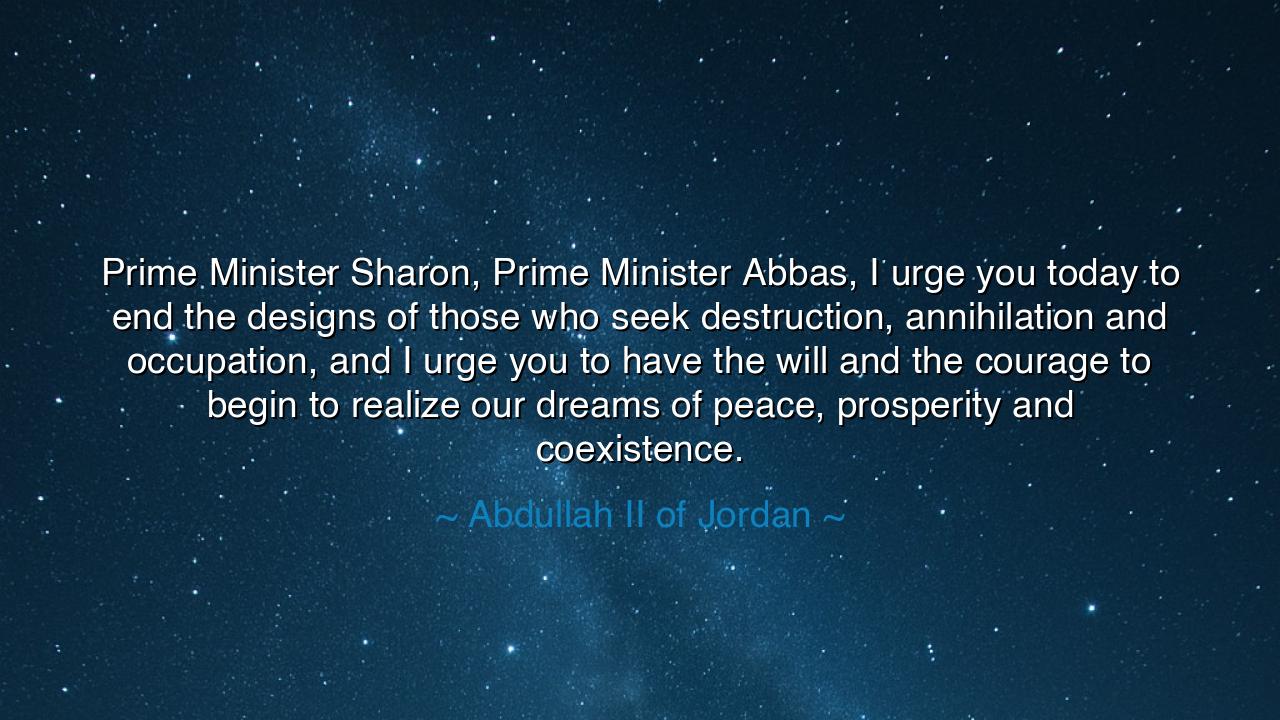
Prime Minister Sharon, Prime Minister Abbas, I urge you today to
Prime Minister Sharon, Prime Minister Abbas, I urge you today to end the designs of those who seek destruction, annihilation and occupation, and I urge you to have the will and the courage to begin to realize our dreams of peace, prosperity and coexistence.






When King Abdullah II of Jordan stood before the leaders of Israel and Palestine and declared, “Prime Minister Sharon, Prime Minister Abbas, I urge you today to end the designs of those who seek destruction, annihilation and occupation, and I urge you to have the will and the courage to begin to realize our dreams of peace, prosperity and coexistence,” his words were not merely political diplomacy — they were the cry of a weary soul, the voice of a people who had seen too much blood, too much division, and too much loss. His plea was ancient in spirit, echoing the voices of prophets and peacemakers throughout time. In it, he summoned the courage of leaders to resist the intoxication of vengeance and the seduction of power, and instead to embrace the nobler, harder path of peace.
The king’s words arose from the heart of a land that has known the trembling of both faith and fire — the Middle East, cradle of prophets and battleground of empires. For centuries, the region has been torn between visions of unity and the realities of strife. Abdullah II, descendant of the Prophet Muhammad, spoke not as a ruler protecting borders, but as a shepherd yearning to heal wounds between brothers. His call to end “the designs of those who seek destruction, annihilation, and occupation” was a call to rise above the politics of fear — to reject those whose hearts are poisoned by hatred and whose ambitions feed on suffering. It was a summons to courage, not in war, but in forgiveness — a courage far rarer and greater than the courage of battle.
To understand the weight of his plea, one must remember the time in which he spoke. The Israeli-Palestinian conflict, rooted in decades of mistrust and bloodshed, had hardened hearts on both sides. Prime Minister Ariel Sharon of Israel was once a warrior, a man shaped by conflict; Mahmoud Abbas, leader of the Palestinian Authority, bore the dreams of a people long displaced. Between them stretched a river of sorrow — generations of grief, walls of fear, and the graves of the innocent. And yet, Abdullah stood before them and dared to dream of peace, prosperity, and coexistence. His words carried not the arrogance of command, but the humility of a bridge-builder, one who believes that even among enemies, the divine spark of humanity can still be kindled.
In every age, there have been voices like his — voices that dared to call men from the sword to the plowshare. Consider Nelson Mandela, who, after twenty-seven years of imprisonment, emerged not with vengeance, but with forgiveness. His courage was not in conquering his oppressors, but in embracing them as partners in building a new nation. So too did Abdullah speak in that same spirit, urging Sharon and Abbas to transcend their histories and join hands in the labor of healing. For true leadership, he implied, is not measured by victory over others, but by the ability to lead one’s people beyond hatred — toward understanding, dignity, and shared hope.
The origin of Abdullah’s wisdom lies in Jordan’s own fragile role as a nation of peace amid turmoil. Surrounded by conflict, he inherited from his father, King Hussein, a legacy of diplomacy, compassion, and unwavering belief in dialogue. Hussein had signed peace with Israel in 1994, becoming one of the first Arab leaders to do so. Abdullah, following his father’s path, sought not only treaties, but transformation — a peace of hearts, not just of papers. He understood that prosperity cannot grow in the soil of hatred, and that coexistence is not a dream, but a discipline: one cultivated daily through patience, empathy, and courage.
The king’s appeal for will and courage is perhaps the most powerful part of his message. For peace, as he knew, is not the natural state of the human heart — it must be chosen again and again. It requires will to forgive when wounded, courage to trust when betrayed, and vision to see beyond the immediate to the eternal. The temptation to seek destruction and domination is ancient, but so is the calling to peace. It is the call of the prophets, of the wise, of the divine itself — the reminder that in lifting others from despair, we lift ourselves from darkness.
Let this, then, be the lesson of King Abdullah’s words: peace is not the absence of struggle, but the triumph of conscience. Each of us, in our own lives, faces the same crossroads — to respond to hurt with retaliation, or with reconciliation; to divide, or to unite. The path of peace will always demand more of us, but it will also give more in return. Begin where you are: mend one broken bond, listen without judgment, speak truth without cruelty. These small acts, multiplied across a nation, can move the world closer to the dream of coexistence he envisioned.
For in the end, the call of Abdullah II is not just for nations — it is for humanity. It is a reminder that prosperity without peace is hollow, and power without compassion is ruin. So let us, too, have the will and the courage to realize this dream — to build a world where our strength is not in weapons, but in wisdom; where our glory is not in conquest, but in compassion; and where, at last, the children of Abraham may walk side by side, in peace, upon the same holy ground.






AAdministratorAdministrator
Welcome, honored guests. Please leave a comment, we will respond soon